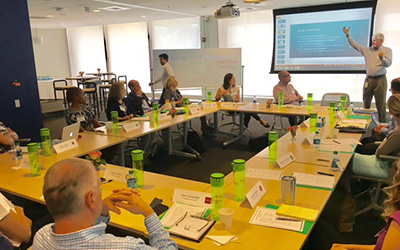Connecticut by the Numbers – UConn is on the move this week, literally as well as figuratively. Wednesday will see the ribbon cutting for the new Hartford campus, which is relocating from its suburban campus in West Hartford after nearly five decades away from the Capital City. And in Stamford, students will be moving into student housing beginning this weekend, the first time that has been possible.
My New Zealand Road Trip

I arrived in New Zealand on May 30th and started classes July 24th, giving me plenty of time to explore this beautiful country before the semester started. My friend and recent UConn alum, Richie and my other friend Alexa joined me on this adventure. Continue Reading
UConn Innovation Quest: Macroscopic Solutions
CTStartup Podcast– Though most of the startups that participated in the UConn Innovation Quest are in the earliest stages of building their business, one returning company, Macroscopic Solutions, is a veteran of the IQ challenge, and returned to offer both advice, and a look at just how far they have come.
We sat down with Mark Smith of Macroscopic, who has been a guest on CTStartup as well, to discuss how IQ helped his business grow from an idea into a full-time job with international reach.
UConn Analytics Graduate Program Fosters Camaraderie Among Career Coaches
A dozen colleges and universities were represented at the 2017 UConn Analytics Roundtable on July 18 at the Graduate Business Learning Center (GBLC) in downtown Hartford.
The goal of the event was to form alliances between career coaches from Northeast business schools with analytics/data science graduate programs.
In addition to UConn, participating universities included: Clark, Syracuse, Merrimack College, NYU, Quinnipiac, Fordham, Brandeis, SUNY Buffalo, Rutgers, Boston University and the University of New Hampshire.
Professor John Wilson from the OPIM department was the keynote speaker and addressed the audience about the trends and future of analytics.

“From the moment guests arrived there was chatter and energy in the room,” said Katherine Duncan, a UConn MSBAPM career adviser, who organized and moderated the event. “It was clear that all invited had passion for helping students and enthusiasm to share.”
UConn Grad Experiences Entrepreneurial Evolution
Innovation Destination Hartford – University of Connecticut graduate Ali Oshinskie is a driven entrepreneur. The self-taught podcaster launched Podstories in May 2017 and is making a name for herself here in Greater Hartford.
Ali and Innovation Destination Hartford Website Curator Nan Price met at Café Fifty-Five for coffee and conversation about Ali’s experience with UConn’s Innovation Quest and what it means to be an entrepreneur.
Four Greater Hartford Leaders Receive Lifetime Achievement Awards
New Associate Deans for Business Programs

Professors Day, Souder Assume New Leadership Roles; Strive to Further Distinguish Business Programs
The School of Business has appointed two veteran professors, Bob Day and David Souder, to its top leadership team. Continue Reading
UConn Innovation Quest: Flux Forcefield
CTStartup Podcast– No matter what automakers do, creative thieves find ways to defeat even the most elaborate anti-theft devices. Indeed, it is almost impossible to stop a truly determined thief, and even if you do, proving their guilt can be difficult unless you catch them red-handed. But what if you could add an anti-theft device to your car that did just that?
The students behind Flux Forcefield, another entry in UConn’s Innovation Quest business incubator, has created an anti-theft deterrent that could send repeat offenders behind bars for a long time.
UConn Stamford Ready to Open Its First Student Housing
Report Highlights Risks, Rewards of Starting a Business
NewsTimes.com – They may be young and small, but collectively they are a force to be reckoned with in the overall economy.
They are startups, and they account for one-third of all small businesses and a large portion of innovation and productivity, according to the Report on Startup Firms, the second in a series of reports based on the 2016 Small Business Credit Survey. Conducted by the Federal Reserve Bank of New York and released last week, the report defines startups as small businesses that were five years or younger in 2016 and had full- or part-time employees.